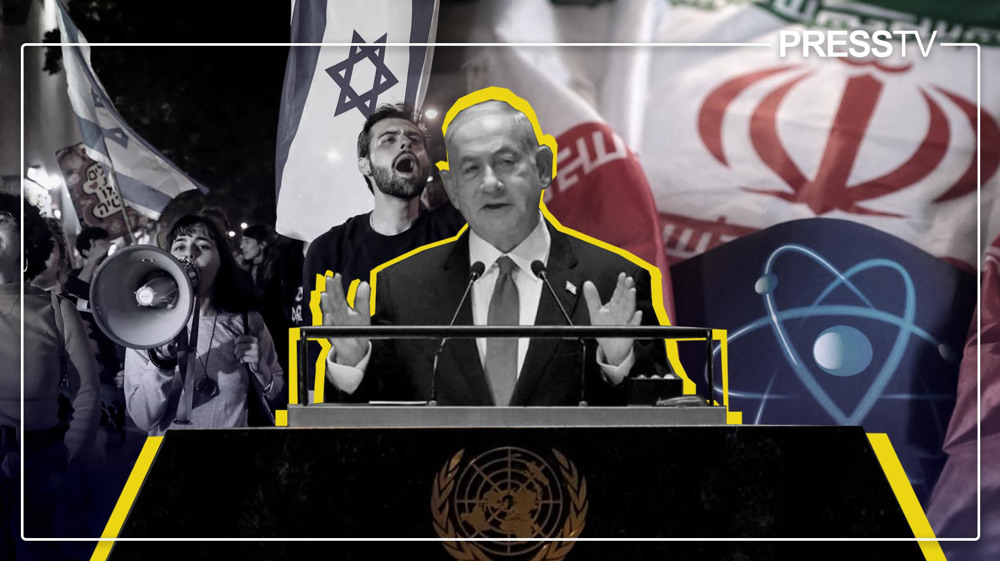By Xavier Villar
This year’s United Nations General Assembly (UNGA) in New York proved once again that the world is transitioning from a unipolar to a multipolar order amid the rise of the Global South.
Iranian President Ebrahim Raeisi’s speech was the highlight of the summit that laid bare the hypocrisy of Western countries on human rights and announced the demise of Western hegemony.
Israeli regime’s premier Benjamin Netanyahu also addressed the summit, in the near-empty hall as most world leaders skipped his speech, and again resorted to his hollow threats against Iran.
His speech included a direct “nuclear threat” against the Islamic Republic of Iran, even though his advisors later backtracked and said it was misread by the megalomaniac Israeli regime leader.
“Above all, Iran must confront a credible nuclear threat. As long as I am the Prime Minister of Israel, I will do everything within my power to prevent Iran from acquiring nuclear weapons,” he said during the speech, met with a deafening silence.
This threat, in direct contravention of the United Nations Charter, rekindled the debate regarding the clandestine nuclear program of the Zionist entity, which it has concealed from the world for decades.
The successive regimes in Tel Aviv have consistently denied the possession of nuclear weapons, but Netanyahu’s statement put all speculation to rest and confirmed what was already known.
What is significant about his UNGA speech, apart from the grave nuclear threat, is the discourse that, typically found in xenophobic movements, suggests the existence of an “other” that is enjoying excessively, and this excess is perceived as a “theft of one’s own enjoyment.”
In other words, the speech pushed the argument that a particular group or community cannot access its legitimate rights because another community is preventing it.
A classic example of this perception of “enjoyment theft” would be the notion expressed by various xenophobic groups, who argue that all their hard work in building a community where they can be happy is hindered by the presence of foreigners who benefit from the efforts of the original residents.
Consequently, the community cannot fully enjoy its benefits due to the belief that foreigners have usurped the source of enjoyment for the natives.
In this case, Netanyahu’s discourse, the Zionist political enjoyment, which is the ability to find satisfaction through the construction of a stable political community, is disrupted by the presence of various signifiers that connect in a chain of equivalence.
These signifiers become symbols of a totality that opposes the possibility of maintaining the political stability of the project of Zionism.
These multiple signifiers can be seen as political demands. Each of these demands are, on one hand, specific and concrete, but on the other hand, through the creation of equivalent links, they connect to the overall set of other demands.
To illustrate this point better, let’s take the specific political demand of Syria in relation to repeated aggression and airstrikes carried out by Zionist aircraft over Damascus.
On one level, this demand seeks to halt the airstrikes, but at the same time, this very demand becomes the visible part of a broader set of political demands against Zionism.
It functions as the tip of an iceberg representing the totality of other political demands, such as the Palestinian struggle or the relationship between India and the Zionist Entity, among others.
Simultaneously, the political demands that oppose Zionism generate an antagonism, which is the starting point of the political sphere.
In this context, the antagonism can be expressed in Islamic terms as the confrontation between the oppressed and the oppressors.
In other words, the articulation of various demands and the creation of this antagonism aim at constructing a hegemony that seeks, on one hand, the dismantling of the existing hegemony and, on the other hand, the establishment of a new social order to replace the older one.
Once again, when analyzing Netanyahu’s discourse at the UNGA and his threat towards the Islamic Republic, it becomes evident that for Zionism, its political enjoyment, understood as stability, is hindered by the presence of the Islamic Republic and other members of the so-called Axis of Resistance.
There is a perception of a “theft of political enjoyment” at the hands of others whose demands take on a totally antagonistic character.
Opposition to Zionism, in its pursuit of building an opposing hegemony, suggests that the stability of Zionism as a political project is contingent.
Despite efforts to control and tame these demands, it becomes evident that they can only be satisfied through the destruction of the supposed stability of Zionism
At the same time, it’s important to understand that Netanyahu’s threats are not solely directed at Iran but are aimed at all specific signifiers that individually oppose both Zionism and the racism it represents.
In this context, Iran, through the chain of equivalence, symbolizes all those particular movements and demands. Similarly, one could say that Palestine represents the demands of Syria, Iran represents the demands of Palestine, and Hezbollah represents the demands of Hamas or Islamic Jihad.
Therefore, Netanyahu issued his nuclear threat against the construction of a bloc against Zionism. He did so because he was aware that both his discourse and his political perks were exhausted.
Xavier Villar is a Ph.D. in Islamic Studies and researcher who divides his time between Spain and Iran.
(The views expressed in this article do not necessarily reflect those of Press TV)




